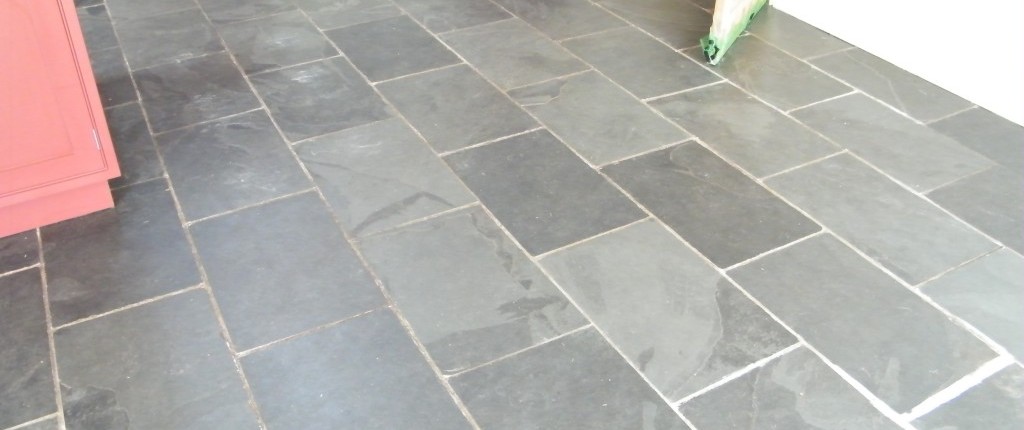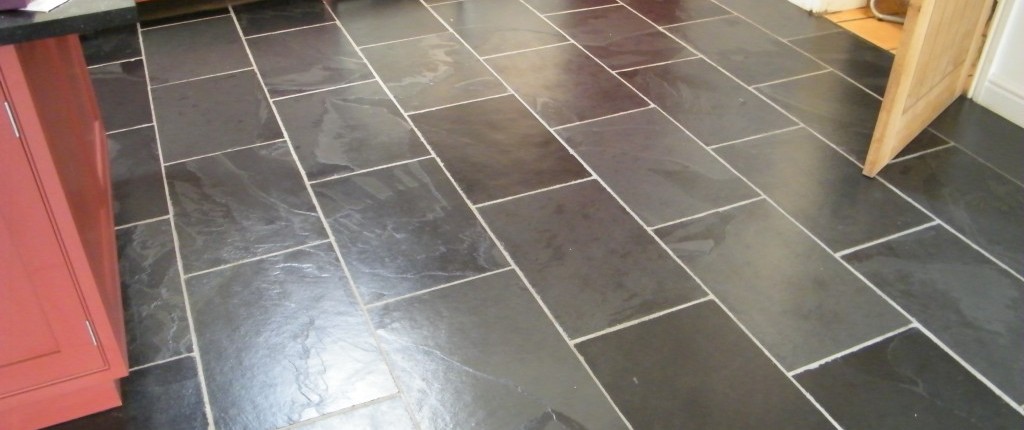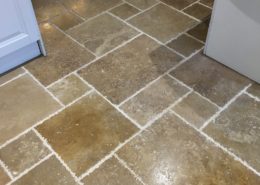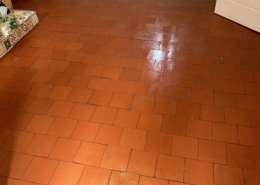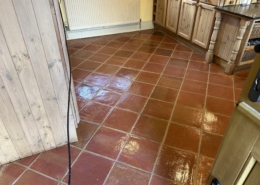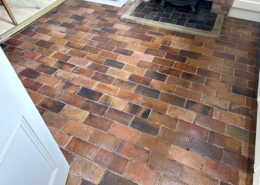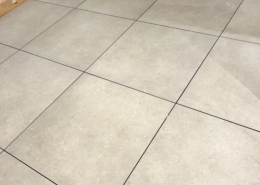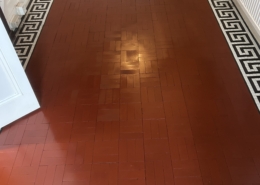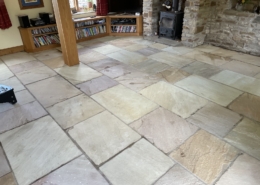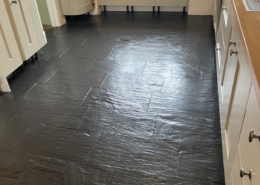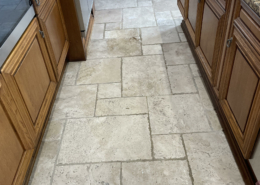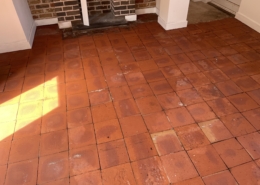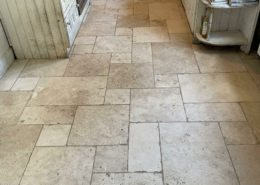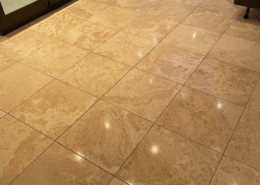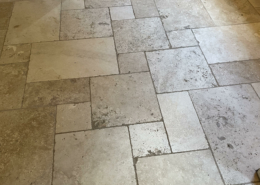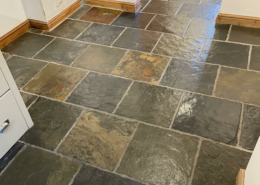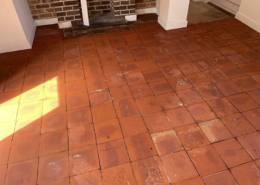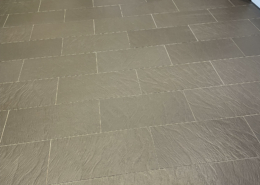Slate Flooring Cleaning & Restoration Staffordshire
Slate is a classic choice for tiling floors and other surfaces around the home. It’s certainly a tough type of stone but it requires work to keep it looking its best. Could your slate flooring benefit from a restoration? Tile & Stone Medic Staffordshire are here to help!
Common issues
Slate doesn’t stand up well to day-to-day scratches and is also water resistant. It doesn’t generally suffer from the level of surface marking as other floor tiles. It does, however, chip and flake, which can be worrying. But if you’ve noticed small chips to your slate it may not actually be a big problem. Especially after recently being installed, it is quite normal and contributes to its unique look. If you’re concerned that the flaking seems excessive and the floor has become uncomfortable underfoot, it’s likely a specialist slate flooring cleaning service is needed.
Some slate floors can become duller in appearance over time. Once gleaming tiles that brightened up a room eventually dampen. The shine can disappear entirely if the slate isn’t well maintained. This happens when the sealant wears away and is especially noticeable with wet-look sealer.
Grouting between tiles will wear down over time too. It’s not as water resistant or tough as slate, so this can be a bit of a magnet for dirt and warping. When grout fails tiles will become loose, cracked tiles can occur when aged grouting stops holding tiles in place.
How we carry out slate flooring cleaning
Most commonly with slate a good clean and topping up or reapplying the sealant is all that’s required. Particularly when applying a fresh coat of wet look sealer, a top up can restore an amazing amount of shine back into a once dull slate floor. In some cases a professional job can leave it even better than new. We have a range of sealant products to offer so if a reflective finish isn’t what you’re looking for there are many other variations to pick from. Of course, removing all built up dirt from the top of the slate tile is essential before any sealant can be applied. For this we would apply one of our many specialist cleaning solutions depending on the cleanliness of the slate.
In cases where tiling has badly chipped or shattered, replacement slate will be needed for a full restoration. We can help find suitable replacements where necessary. If your grouting needs some maintenance we can provide a range of solutions to ensure you get the longest lasting and most resilient solution for your floor.
Will repairing my slate floor tiles cause disruption
Slate is so strong that, unless large areas of tiling need to be replaced, restoration is generally simple and not disruptive. No loud or heavy machinery is necessary and any chemicals used will be perfectly safe for application in the home. We take health and safety very seriously and always work to the highest possible standards.
Is your slate floor in need of repair or restoration? Why not get in touch with Tile & Stone Medic Staffordshire? We offer an outstanding value service and have the experience needed to deliver you stunning results, every time.
FAQs: Slate Cleaning
Yes, of course. Because slate is less porous than most natural stone it is not uncommon to see it used in bathrooms and even wetrooms. Such use places high demands on the slate, with the material being frequently exposed to water, as well as cleaning products, which can leave undesirable marks such as efflorescence. Not only can we carry out thorough cleaning and restoration work in these situations, we can apply the most appropriate sealants to help protect your investment too.
Slate can come in many types of shapes and sizes as well as different textures. In all cases, we can work with you to find the best solution for your slate. We can clean and restore slate that is riven, or semi riven, where the tile has been made by splitting the naturally occurring rock down a seam. We also work with other types of slate, such as those that have been honed or polished to a smoother finish. Regardless, get in touch to discuss how we can find the best cleaning and restoration solution for your needs.
While slate is relatively good at resisting water (why it’s often used in roofing), it is still somewhat vulnerable to liquids, especially the acids found in food and drink. We would strongly suggest that a sealant is periodically applied to your slate floor. This will also help protect against scratches, to which slate is much more vulnerable. We’d suggest that you regularly and carefully sweep and vacuum to remove any dirt or grit that accumulates on the floor as this can leave scratches when trodden on. A sealant can create a protective layer, meaning that this barrier gets worn down by such erosion, rather than the stone itself. We can consult with you to find the best sealant for your slate floor.
The process we carry out will depend on your specific floor and the use that it gets. There will be variations for different materials and the finish that you wish to achieve. The process will also be impacted by the full scale of work that we carry out, for example which types of cleaning and restoration are being performed. It is not unusual to apply several layers of sealant if this is necessary and appropriate.
Firstly, a floor should always be sealed when it is first laid. Get in touch with us straight away if this hasn’t been carried out already. It will also need periodic sealing in order to protect the floor on an ongoing basis. How often sealing is required depends on a number of factors such as the specific material used for your flooring and the kind of use it has to survive. For example, a bathroom with natural tiles that is frequently exposed to water may require sealing more often than porcelain tiles in a kitchen. Frequent maintenance, such as sweeping and hoovering up the dust and grit that erodes floors when trodden on can help. Once the sealant is worn away, not only will scratches be more likely, the risk of staining or permanent damage from liquids is drastically increased as there is no protective layer to prevent absorption. If in doubt get in touch with our team of friendly technicians who can discuss your needs.
We have a range of high quality Faber products which will help protect your floors from damage. As every type of floor is different and has myriad uses, we will consult with you to work out the best way to protect your investment. We can apply topical sealants which form a protective layer on top of the floor, or if needed an impregnating sealant, which will be partially absorbed into the stone or tiles. There are many variations of these sealants and as each floor type has unique characteristics and vulnerabilities we can work with you to find and apply the the best kind of protection.
Absolutely. If this was not carried out by those who fitted the floor get in touch immediately to ensure that the appropriate protection can be applied as promptly as possible. We would recommend that this is carried out once the flooring is in place as this means the grout, which is generally more porous, will also be protected.
We apply a sealer to a floor in order to protect it. Different types of floor, both manmade and natural stone, are vulnerable to different sorts of damage. They can all be harmed by chemicals to a certain degree, even by the acid in food and drink spillages, as they will be very slightly porous. As well as this, they can be worn away by physical damage. Even foot traffic can have a big impact if dust or grit has built up on the floor, since it increases abrasions. A sealant will reduce the chance of a spill becoming a stain by reducing the floor’s ability to absorb liquids. It can also help protect the appearance of the floor by forming a protective barrier. A sealant won’t prevent all damage and it will still wear away over time, but it will help your floors last longer, helping protect your investment. Sealants will even help protect your floor from UV radiation which can lead to fading over the lifespan of a high value stone or tiled floor. We can consult with you to find the best sealant for your floor and the type of use it gets to make sure it receives the best form of protection.
Yes, we have a range of fillers we can use to repair chipped or dented stone. Please note we can only carry out floor repairs as part of a full deep clean or restoration for your stone floor. Unfortunately, we are not able to attend to carry out repairs in isolation.
Whilst we may use specialist chemicals in the course of our work, we can assure you that by the time we leave all residues will be gone and your tile or stone flooring will be perfectly safe for everyone to use. We work to extremely high standards of health and safety, conducting proper risk assessments where appropriate and never putting you or anyone else in danger.
We always work in the most considerate way possible. Work will be tailored to your needs and will fit around your schedule where possible. We avoid bringing loud or bulky machinery into your home and when a job is complete we thoroughly clean up after ourselves to leave your space looking as tidy as it did when we arrived.

